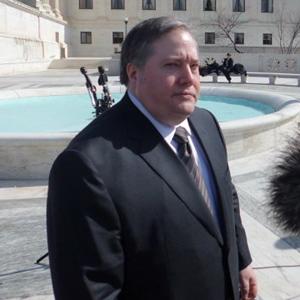JUNE SIMMS: Welcome to THIS IS AMERICA in VOA Special English. I'm June Simms.
Today, we tell about a federal law called the Stolen Valor Act of 2005. The Act bars people from claiming they received military honors when they did not. Any violation is considered a crime.
Recently, the United States Supreme Court heard arguments for and against the law. Christopher Cruise went to the court hearing, and has our report.
(MUSIC)
CHRISTOPHER CRUISE: Let me begin with some history about the Stolen Valor Act. The Act was proposed in both houses of Congress in 2005. The measure easily won congressional approval. It became law after President George W. Bush added his signature in late 2006.

There were no congressional hearings on the Act. And the debate in the House of Representatives lasted just 20 minutes.
Some federal judges and free-speech activists say the law is unconstitutional. They say this case is not about military honors, but about government power. But supporters of the law say it is necessary to protect both the honor of those who have received awards and the integrity of the military honors system. They say the case is about theft -- not about lying.
These competing arguments have made their way to what is sometimes called "the highest court in the land" -- the United States Supreme Court. It was asked whether the government should have the power to jail someone for claiming that they received a military honor when, in fact, they did not. Some observers say the court is really being asked to decide what kinds of lies the federal government can punish. It is a case of free speech versus government power.
(MUSIC)
CHRISTOPHER CRUISE: The case is called "The United States versus Xavier Alvarez." It all started because of comments made at a public meeting in southern California. Xavier Alvarez had been elected to the board of directors of a local water district. He spoke to other board members at a meeting in September 2007.
His own lawyers admit that almost everything he said about himself at that meeting - other than his name - was a lie. Alvarez claimed he had been a police officer, a hockey player and an engineer. He said he was secretly married to a famous and beautiful young actress from Mexico. He also said he had even rescued the American ambassador during the Iranian hostage crisis in the 1970s. None of that is true. But it also was not against the law for him to make those claims.
But then Xavier Alvarez said he was a retired United States Marine. He said he was wounded in battle and had been awarded the Medal of Honor. But Alvarez had never served in the Marines or retired from the armed forces. And he had never earned the country's highest military honor. When he said he had, he broke the law.
(MUSIC)
CHRISTOPHER CRUISE: Lawyers for Xavier Alvarez say he was speaking as an official of an elected body when he lied about the medal. They say this shows he was "engaged in political speech." And, they say, that kind of speech has always enjoyed "special protection" under the Constitution and court rulings.
There are fewer than 90 people alive who have received the Medal of Honor. Someone apparently suspected Mr. Alvarez was lying about being one of them. The Federal Bureau of Investigation was given a recording of the water board meeting. The FBI investigated and found that Mr. Alvarez had not earned any medals, let alone the Medal of Honor. He soon became one of the first people charged with violating the Stolen Valor Act.
He admitted guilt in court with the understanding that he would appeal the ruling. He was fined 5,000 dollars and ordered to work without pay for over 400 hours at a hospital for military veterans. This is known as community service. It is a way that judges can punish those found guilty of violating a law without sending them to prison.
People who violate the Stolen Valor Act can be sent to jail for six months for making claims about receiving lower-level awards. They can be jailed for up to one year for making claims about receiving higher-level awards like the Medal of Honor. However, most people convicted of violating the law are ordered to perform community service and are not jailed.
Xavier Alvarez appealed his conviction to a three-judge panel of the Ninth Circuit Court of Appeals. The panel ruled two-to-one that the Act is unconstitutional. Two judges said the law violated the First Amendment guarantee of free speech. The Chief Judge of the Court said that if the Constitution leaves unprotected all lies, then we would all be considered criminals. Chief Judge Alex Kosinski said we lie for many reasons, and such lying should generally not be punished.
But another judge in a different court said the Stolen Valor Act does not violate the constitution. The judge said "false statements of fact do not enjoy constitutional protection."
(MUSIC)
CHRISTOPHER CRUISE: On the morning of Wednesday, February 22nd, the United States Supreme Court heard arguments for and against the law. Lawyers representing each side of the issue presented their arguments. The court's justices were very aggressive in their questioning of both sides.
Donald B. Verrilli, Junior, represented the government in the case. Mr. Verrilli is the Solicitor General of the United States, the government lawyer who defends federal laws. He was asked by Chief Justice John Roberts whether the government has the power under the Constitution to make any lie illegal.
CHIEF JUSTICE ROBERTS: "But where do you stop? I mean, there are many things that people know about themselves that are objectively verifiable where Congress would have an interest in protecting. High school diploma. It is a crime to state that you have a high school diploma if you know that you don't. That's something you can check pretty easily. And Congress can say: We want people to finish high school. It's a big thing to have a high school diploma. So we want to make sure nobody goes around saying they do when they don't. What about that case?"
Later, Solicitor General Verrilli said why the government wanted the Court to find the law constitutional.
GENERAL VERRILLI: "And I, what I think with respect to the government's interest here and why there is a harm to that interest is that, the point of these medals is that it's a big deal. You get one for doing something very important after a lot of scrutiny. And for the government to say this is a really big deal and then to stand idly by when one charlatan after another makes a false claim to have won the medal does debase the value of the medal in the eyes of the soldiers. It does do that. That is the government's interest."
Jonathan Libby is a deputy federal public defender. He represented Xavier Alvarez at the court hearing. Mr. Libby admitted to the Court that the defendant is a liar. He was asked by Justice Samuel Alito if he believed the Constitution protects lies.
JUSTICE ALITO: "But you really think that there is - that the First Amendment - that there is First Amendment value in a bald-faced lie about a purely factual statement that a person makes about himself, because that person would like to create a particular persona? 'Gee, I would, I won the Medal of Honor. I was a Rhodes scholar, I won the Nobel Prize.' There's a personal - the First Amendment protects that?"
MR. LIBBY: "Yes, Your Honor, so long as it doesn't cause imminent harm to another person or imminent harm to a government function."
After the hearing, Mr. Libby spoke to reporters.

JONATHAN LIBBY: "Well, it's not OK to lie, generally. The issue is whether Congress can make it a crime to tell a lie, and the First Amendment would suggest that Congress doesn't get to decide what we can and cannot say. What we've argued is there needs to be harm associated with the lie in order for it to be unprotected under the First Amendment. Here there was no harm as a result of what Mr. Alvarez said...If lies are not protected – have no protection, which is what the government seems to suggest here, then who knows where it could end? If there's imminent harm that results from the lie, then you know that's something that Congress has the right to worry about. If there's not harm, then it shouldn't matter where you say it or who you say it to."
CHRISTOPHER CRUISE: A video of Mr. Libby can be seen on our website, voaspecialenglish.com. Government lawyers did not speak to reporters following their oral arguments at the Supreme Court.
The Court will announce its decision before the end of June.
If the Court says the Stolen Valor Act is unconstitutional, some members of the House of Representatives are ready. They have proposed a bill that would make lying about receiving a military honor illegal only if the person telling the lie planned to make money from it. That more narrowly-written law might be acceptable to the justices of the Supreme Court.
As for Xavier Alvarez, he was found guilty in 2009 of stealing over 4,000 dollars in public money. He was sentenced to five years in a California state prison. He was recently freed after meeting conditions for release.
(MUSIC)
JUNE SIMMS: Our program was written and read by Christopher Cruise. Our producer was Brianna Blake. I'm June Simms. You can find transcripts and MP3s of our programs at voaspecialenglish.com. Join us again next week for THIS IS AMERICA in VOA Special English.
Solicitor General: 副檢察長
charlatan: a person who makes elaborate, fraudulent, and often voluble claims to skill or knowledge 吹牛者
(來源:VOA 編輯:旭燕)
